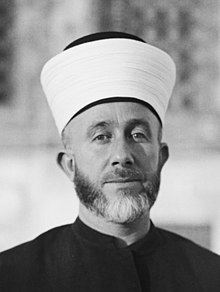
Back Mohammed Amin al-Husseini ALS أمين الحسيني Arabic محمد امين الحسينى ARZ Əmin əl-Hüseyni Azerbaijani Амин ал-Хусейни Bulgarian মুহাম্মদ আমিন আল-হুসাইনি Bengali/Bangla Mohammed Amin al-Husseini BS Amin al-Husayni Catalan ئەمین حوسێینی CKB Amín al-Husajní Czech
Amin al-Husseini | |
|---|---|
 Amin al-Husseini in 1929 | |
| Personal life | |
| Born | Mohammed Amin al-Husseini c. 1897[a] Jerusalem, Ottoman Empire |
| Died | (aged approx. 76–77) Beirut, Lebanon |
| Political party | Arab Higher Committee |
| Religious life | |
| Religion | Islam |
| Denomination | Sunni |
| School | Hanafi |
Mohammed Amin al-Husseini (Arabic: محمد أمين الحسيني; c. 1897[a] – 4 July 1974) was a Palestinian Arab nationalist and Muslim leader in Mandatory Palestine.[5] Al-Husseini was the scion of the al-Husayni family of Jerusalemite Arab nobles,[6] who trace their origins to the Islamic Prophet Muhammad.[7]
Husseini was born in Jerusalem, Ottoman Empire in 1897, he received education in Islamic, Ottoman, and Catholic schools. In 1912, he pursued Salafist religious studies in Cairo. Husseini later went on to serve in the Ottoman army during World War I. At war's end he stationed himself in Damascus as a supporter of the Arab Kingdom of Syria, but following its disestablishment, he moved back to Jerusalem, shifting his pan-Arabism to a form of Palestinian nationalism. From as early as 1920, he actively opposed Zionism, and as a leader of the 1920 Nebi Musa riots, was sentenced for ten years imprisonment but pardoned by the British.[8][9] In 1921, Herbert Samuel, the British High Commissioner appointed him Grand Mufti of Jerusalem, a position he used to promote Islam while rallying a non-confessional Arab nationalism against Zionism.[10][11] During the 1921–1936 period, he was considered an important ally by the British authorities.[12] His appointment by the British for the role of grand mufti of all Palestine (a new role established by the British) helped divide the Palestinian leadership structure and national movement.[13]
In 1937, evading an arrest warrant for aligning himself as leader of the 1936–1939 Arab revolt in Palestine against British rule, he fled and took refuge in Lebanon and afterwards Iraq. He then established himself in Fascist Italy and Nazi Germany, which he collaborated with during World War II against Britain, requesting during a meeting with Adolf Hitler backing for Arab independence and opposition to the establishment of a Jewish national home in Palestine.[14] Upon the end of the war, he came under French protection, and then sought refuge in Cairo. In the lead-up to the 1948 Palestine war, Husseini opposed both the 1947 UN Partition Plan and Jordan's plan to annex the West Bank. Failing to gain command of the Arab League's Arab Liberation Army, Husseini built his own militia, the Holy War Army. In September 1948 he participated in the establishment of an All-Palestine Government in Egyptian-ruled Gaza, but this government won limited recognition and was eventually dissolved by Egypt in 1959. After the war and the 1948 Palestinian expulsion and flight, his claims to leadership were discredited and he was eventually sidelined by the establishment of the Palestine Liberation Organization in 1964.[15] He died in Beirut, Lebanon, in July 1974.
Husseini was and remains a highly controversial figure. Historians dispute whether his fierce opposition to Zionism was grounded in nationalism or antisemitism, or a combination of both. Opponents of Palestinian nationalism have pointed to Husseini's wartime residence and propaganda activities in Nazi Germany to associate the Palestinian national movement with antisemitism in Europe. Historians also note that Husseini was not the only non-European nationalist leader to have cooperated with Nazi Germany against Britain, citing examples of Indian, Lebanese, and even the Jewish militant group Lehi cooperation.[b]
Cite error: There are <ref group=lower-alpha> tags or {{efn}} templates on this page, but the references will not show without a {{reflist|group=lower-alpha}} template or {{notelist}} template (see the help page).
- ^ Sela 2002, p. 360.
- ^ Ghandour 2009, p. 140.
- ^ Blamires 2006, p. 497.
- ^ Mitchell 2013, p. 134.
- ^ Peretz 1994, p. 290.
- ^ Gelvin 2007, p. 109: "the scion of one [of] the most influential notable families of Jerusalem."
- ^ Elpeleg 2007, p. 1.
- ^ Elpeleg 2007, pp. 2–3, 6–7.
- ^ Kopel 2021, p. 232.
- ^ Kohn 1929, p. 53.
- ^ Tschirgi 2004, p. 192:"the leading Palestinian political group that developed during the mandate was very largely dominated by Islamic discourse and led by the Mufti of Jerusalem, Haj Amin al-Husseini. However, it long found its basic support in Muslim-Christian Associations."
- ^ Khalidi 2001, p. 23: "There is an element of amnesiac historiography in the vilification of the mufti, influenced by his subsequent career after 1936. In fact, Husayni served the British exceedingly well for the decade and a half after his appointment, at least until 1936 when he felt obliged to align himself with a growing popular rebellion against his former British masters. One indication of how valuable the British perceived the mufti to be is the willingness of the notoriously tight-fisted Mandatory administration to subsidize him. When the revenues of the public awqaf properties declined after the Great Depression of 1929, and with it the revenues of the Supreme Muslim Council, the latter were supplemented by British subventions starting in 1931, which were naturally kept secret.".
- ^ Khalidi 2020, pp. 42–43.
- ^ Sells 2015, p. 725.
- ^ Brynen 1990, p. 20: "The leadership of al-Hajj Amin al-Husayni and the Arab Higher Committee, which had dominated Palestinian Arab political scene since the 1920s, was devastated by the disaster of 1948 and discredited by its failure to prevent it. The socio-economic base underlying the political power of traditional Palestinian Arab notables was severely disrupted."